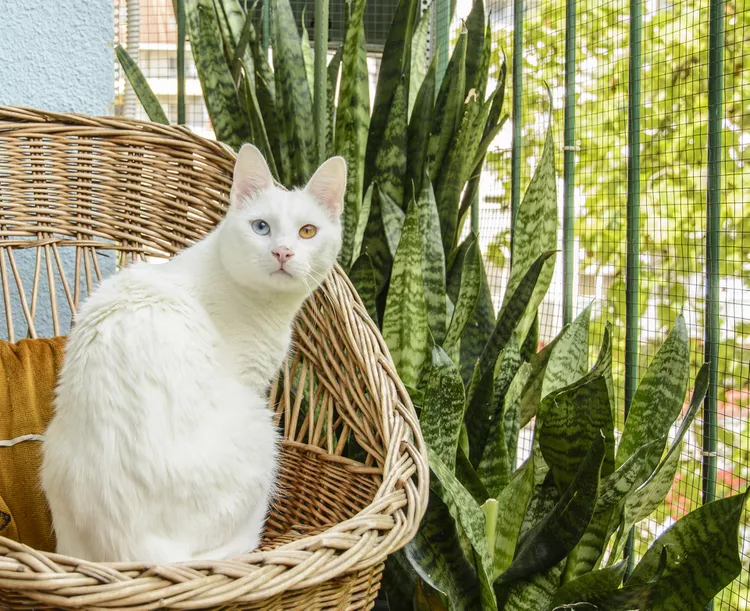Are Snake Plants Toxic to Cats?

Snake plants, also called Mother-in-Law's Tongue, have gained popularity as one of the most resilient and low-maintenance houseplants. However, they might not be the best fit for homes with cats because they can be toxic to cats. Depending on the amount of plant ingested, the size and health of your cat, and your cat's sensitivity to the plant, toxicity symptoms can range from mild discomfort to serious complications.
Here's exactly how to keep your cats safe around snake plants.
Toxicity of Snake Plants to Cats
Snake plants (Dracaena trifasciata), contain toxic substances called saponins. These compounds are naturally occurring in various plant species and serve as a defense mechanism against herbivores. Unfortunately, when cats ingest saponins, they can cause gastrointestinal irritation and other adverse effects.
Saponins have a molecular structure that allows them to interact with lipids, which are essential components of cell membranes. When saponins from plant material come into contact with the delicate membranes in the cat's gastrointestinal tract, they can cause irritation and inflammation. This can affect the absorption of nutrients and water in the gut, leading to gastrointestinal upset and dehydration.
Saponins can also have systemic effects if they are absorbed into the bloodstream, leading to hemolysis, which is the destruction of red blood cells. This can cause anemia and other serious health complications.
Symptoms of Snake Plant Toxicity in Cats
If your cat has nibbled on or ingested any part of a snake plant, it's crucial to watch for any signs of toxicity. If left untreated, snake plant ingestion can lead to more serious complications. If you think that your cat has ingested any amount of snake plant or any other plant containing saponins, seek immediate veterinary attention. Your veterinarian can assess your cat's condition and take measures to mitigate the toxic effects of saponins on your cat's health.
What To Do If Your Cat Eats a Snake Plant
If you suspect or witness your cat ingesting a snake plant, take immediate action to ensure your pet's safety:
- Remove the plant: If your cat is still near the snake plant, remove them from the vicinity to prevent further ingestion. You may wish to take a photo of the plant for your veterinarian.
- Keep a close eye on your cat: Monitor your cat closely for any signs of toxicity and keep a record of them for your vet.
- Contact your veterinarian: Call your veterinarian or a pet poison control hotline immediately (such as ASPCA Poison Control or Pet Poison Helpline) for guidance on the next steps. They will assess the situation and provide personalized advice based on your cat's condition.
Depending on the severity of the symptoms, your veterinarian may recommend bringing your cat in for examination and treatment. In some cases, supportive care, such as fluid therapy or medication, may be necessary. Never attempt to induce vomiting without your vet's recommendation as this may cause more damage to the gastrointestinal tract.
How To Keep Your Cats Safe from Snake Plants
While snake plants can be a delightful addition to your indoor garden, always be aware of the potential risks they pose to cats. Consider placing snake plants in areas that are inaccessible to your cat. Better yet, opt for cat-safe houseplants to ensure a feline-friendly environment, including:
- Spider plants
- Orchids
- Boston ferns